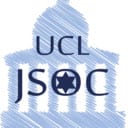Sir Martin Sorrell: 2012 and beyond
By news editor, on 22 January 2012
Adam Taylor, UCL Second year Economics undergraduate and President of UCL Jewish Society.
 For the past two decades, the advertising business has been dominated by one man and the company that he built. WPP started in 1971 as a manufacturer of shopping baskets. In 1985, Sir Martin Sorrell bought a controlling stake in the company and, over the subsequent 30 years, transformed it through a series of audacious acquisitions into the largest advertising group in the world, with annual revenues of more than £9 billion. On 16 January, UCL Jewish Society hosted Sir Martin to address more than 200 people in the Cruciform Lecture Theatre.
For the past two decades, the advertising business has been dominated by one man and the company that he built. WPP started in 1971 as a manufacturer of shopping baskets. In 1985, Sir Martin Sorrell bought a controlling stake in the company and, over the subsequent 30 years, transformed it through a series of audacious acquisitions into the largest advertising group in the world, with annual revenues of more than £9 billion. On 16 January, UCL Jewish Society hosted Sir Martin to address more than 200 people in the Cruciform Lecture Theatre.
The introduction promised the title of ‘2012 and beyond’, but Sir Martin was quick to announce, to much amusement, that he had no intention of sticking to this. Rather, he would open the floor immediately to questions.
Nonetheless, Sir Martin was unable to avoid the title as the first question asked was for his predictions for the year ahead. 2012, he revealed, would be a special kind of year for advertising. The quadrennial occurrence of the US elections, the Olympics and the European football championships would ensure plentiful demand for the services of WPP’s numerous companies.
Beyond 2012, he predicted, things could look a little more uncertain. The potential shift in economic power away from the western world and towards the emerging economies would provide new sources of business across the world.
Likewise, the rise of digital technology will mean that WPP is forced to explore new areas in order to succeed. Sir Martin told how he is less worried about the Eurozone than about the US. He sees the Eurozone lasting, perhaps with a couple of countries leaving. In the US, however, he forecasts Obama being re-elected, with the House remaining controlled by the Republicans, leading to a stalemate over reducing the deficit. This, he claimed, is a source for some concern.
The next question asked whether Sir Martin believed it would possible for his story to be repeated in today’s conditions. He stressed that while he does believe it possible, luck will always play a part.
He told the story of how, after shocking the advertising world with a takeover of a company more than 13 times their size, they discovered that the company had been sitting on tens of millions of dollars worth of seriously undervalued Japanese real estate. In the information age, Sir Martin argued, it could perhaps be more difficult to find undervalued companies. But in general, he believes his success could be re-enacted.
The final question asked whether one must be ruthless to succeed in business. Sir Martin discussed what being ruthless means. If ruthlessness means dishonesty, lying and cheating, he doesn’t believe that these are necessary to success. Yet if it means having to take difficult and often painful decisions, he admitted that he is guilty.
Sir Martin concluded by explaining that the people who start businesses are often different to the people who run businesses. Yet his dream was always to do both, and it seems he has succeeded beyond expectations.
After the talk, he was surrounded by would-be protégés offering business cards and asking for more advice on success. Clearly, Sir Martin believes that his story could be repeated by somebody. Many in the audience will have hoped that it might be them.
 Close
Close

